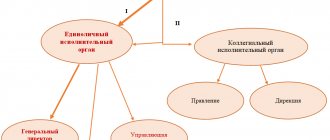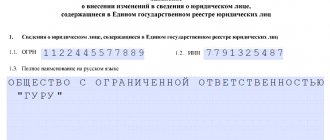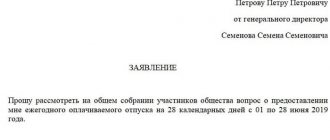Appointment to office
Appoint the General Director in the following order.
Before concluding an employment contract with the general director, a decision must be made by the owner of the organization on his election (appointment) to the position.
This decision can be made by:
- general meeting of participants (shareholders) of the company, documenting it with minutes (for example, in an LLC - minutes of the general meeting of company participants);
- the board of directors (supervisory board) of the company (if the resolution of this issue is within its competence by the charter), formalizing it by decision.
This is provided for in Article 63 and paragraph 3 of Article 69 of the Law of December 26, 1995 No. 208-FZ, Article 37 and paragraph 1 of Article 40 of the Law of February 8, 1998 No. 14-FZ.
If there is only one owner in the organization, then the general director is appointed based on the decision of the sole participant (shareholder) (clause 2 of Article 7 and clause 1 of Article 40 of the Law of February 8, 1998 No. 14-FZ, clause 2 of Art. 2 and Article 69 of the Law of December 26, 1995 No. 208-FZ).
Before concluding an agreement with the general director, check whether there are any violations in the procedure for making a decision on his election (appointment). The decision must not only be made in compliance with all legal requirements, but also correctly formalized (Article 40 of the Law of February 8, 1998 No. 14-FZ, Article 69 of the Law of December 26, 1995 No. 208-FZ). To check the correctness of the decision, refer to the organization's charter. First of all, it is necessary to check which body has jurisdiction over the issue of forming a sole executive body, whether the procedure for convening a meeting or session has been followed, whether the quorum necessary for making a decision has been met, and who is entrusted on behalf of the organization to sign an employment contract with the elected general director.
The general director may have the status of an individual entrepreneur. The legislation does not prohibit this (Article 40 of the Law of February 8, 1998 No. 14-FZ, Article 69 of the Law of December 26, 1995 No. 208-FZ).
Attention : if a person not from among the organization’s employees is applying for the position of general director, make sure that he is not on the register of disqualified persons (Article 32.11 of the Code of Administrative Offenses of the Russian Federation).
To do this, you need to contact the tax service with a request (on paper or electronically) (clause 4 of the Procedure approved by order of the Federal Tax Service of Russia dated December 31, 2014 No. ND-7-14 / [email protected] ). Forms of requests on behalf of an individual and an organization are given in the Administrative Regulations for the provision of information from the register of disqualified persons, which was approved by Order of the Ministry of Finance of Russia dated December 30, 2014 No. 177n.
The request can be submitted electronically through the official website of the Federal Tax Service of Russia or a single portal of state and municipal services. A request on paper can be submitted to any tax office (by mail or through a representative of the organization).
The information contained in the register is open and is provided in the form of an extract in the form approved by order of the Federal Tax Service of Russia dated December 31, 2014 No. ND-7-14 / [email protected] If there is no information about disqualification in the register, a certificate of absence of the requested information.
You will need to pay 100 rubles for providing information. (Clause 1 of the Decree of the Government of the Russian Federation of July 3, 2014 No. 615).
Employees who have been disqualified are prohibited from holding leadership positions in the executive body of the organization for a period of six months to three years (Part 2 of Article 3.11 of the Code of Administrative Offenses of the Russian Federation). If a disqualified employee is in a managerial position, working as the head of an organization will mean failure to comply with an administrative decision, which may result in criminal liability for him (Article 315 of the Criminal Code of the Russian Federation). The employment contract concluded with such an employee must be terminated (Part 1 of Article 84 of the Labor Code of the Russian Federation).
Essentially a similar procedure applies when changing the general director. In particular, first the founders draw up a protocol (the only participant is the decision). Next, an employment contract is concluded and an appointment order is drawn up. Don't forget to notify the tax office as well.
Situation: what order should be used to formalize the appointment of the general director of a JSC or LLC?
The law does not establish this. To avoid any disputes in the future, it makes sense to draw up two documents at once:
- order to take office;
- The order of acceptance to work.
The director issues an order to take office on his own behalf. The basis for the order is the decision of the participants (shareholders) to whom the director is appointed. The order form has not been approved, so it can be free.
Such an order reflects that the procedure for electing a person to this position has been followed: the director was elected by the participants at the meeting, the decision of the participants is documented in the minutes. This order, together with the decision on election, will need to be submitted to the bank where the company’s current account is opened, and to other persons when it is necessary to confirm the powers of the director.
An employment order (in Form No. T-1 or in a self-developed form) must be issued in order to comply with the formal requirements of accounting legislation. Unlike the order on taking office, it does not reflect the election procedure, but determines the regime and nature of the director’s work, and the amount of the official salary.
The procedure for formalizing relations with the general director, who is the sole founder (participant, shareholder), has its own characteristics.
From what moment does a new director take office?
But this article is devoted not so much to the procedure for changing a director, but to issues related to the termination of the powers of the general director and the beginning of the powers of the newly appointed director of the company.
Powers of the general director of an enterprise When changing the general director of a company, questions often arise: At what point do the powers of the previous general director cease, and from what moment does the new general director take office and acquire the corresponding powers? Who must sign an application for amendments to the Unified State Register of Legal Entities? So, from what moment does the new general director of the company take office and acquire powers? The legitimacy of the signature on administrative documents, statements, and contracts depends on the date of assumption of the position of the head of the company.
Beginning of the new CEO's term of office
This is confirmed by the registration authority, since it recognizes the powers of the new general director, despite the lack of information about him in the Unified State Register of Legal Entities when submitting an application for registration of changes in form P14001 in order to register a change in the head of the company. Let us remind you that when making changes to the Unified State Register of Legal Entities related to changes in information about the head of the company, an application is submitted, which is signed by a person who has the right to act on behalf of the legal entity without a power of attorney, i.e.
director The registration authority accepts applications signed both by old directors whose powers have been terminated, and applications signed by new directors, information about which is not available in the Unified State Register of Legal Entities, but subject to the provision, simultaneously with application R14001, of an additional protocol (decision) on the change of the general director in the original .
When does a new director take office?
Important Now he claims (in court) that he did not take office because... an entry was not made in the Unified State Register of Legal Entities indicating that he is the general director.
In my opinion, this is nonsense, but the representative of the plaintiff (manager) claims that there are some regulations that establish the moment the head of the organization takes office and they provide for the need to make an entry in the Unified State Register of Legal Entities. I have not found such regulations.
If they exist, please provide details. #7 IP/Host: .botik.ru Re: The moment of assuming the position of the general director of the organization From the moment of appointment, because in the law on state registration of legal entities.
At what point does the new CEO take office?
The director becomes legitimate from the moment of his appointment/election by the Board of Directors (OSA). When signing the TD, the director agrees to assume the functions of the sole executive officer.
This is the moment of taking office. Usually an order is issued about this. #4 IP/Host: .
ru Re: The moment of assuming the position of the general director of an organization. Typically, the relationship between the manager and the organization is regulated by the Labor Code (if the manager is not involved under a civil law contract as a manager, for example, in an LLC or JSC). No changes were made to the Labor Code regarding the regulation of labor relations with the manager (maybe I missed something?).
Consequently, everything is as usual - hiring is formalized by order, an employment contract is concluded and off we go. And the Unified State Register of Legal Entities, in accordance with the law, is a federal information resource.
If it can be issued at the servicing bank, then the list of documents must be clarified with the credit institution itself. As a rule, since the bank already has a notarized set of statutory documents, it will most likely be enough to submit the Decision/Protocol on the appointment of a new general director to the position, the corresponding order and an extract from the Unified State Register of Legal Entities.
At first glance, this is all, and the procedure for changing the general director is completed, you can breathe a sigh of relief.
But this is where pitfalls sometimes emerge... Peculiarities of changing the general director Answer: when exactly does the authority of the old general director terminate, and when does the authority of the new manager arise? At first glance, the question posed seems insignificant.
TC #10 IP/Host: .ru Re: Re: The moment of assuming the position of the general director of the iustus organization, please explain.
In your opinion, the moment when labor relations arise with the organization’s sole executive officer and the moment when the sole executive officer is authorized to act on behalf of the organization are different things? #11 IP/Host: 213.141.159.
Re: The moment Katrin assumed the position of general director of the organization is different in some respects, but I agree. he cannot sign bills at all until the bank card is certified, and it will not be there until there is an entry in the Unified State Register of Legal Entities #12 IP/Host: .ext-net4.gazsvyaz.
ru Re: The moment of assuming the position of the general director of an organization. Different things happening at the same time. Let me explain. The Labor Code says that the basis for terminating an employment contract with Gena is the adoption of a decision by the authorized body of the legal entity on early termination of the employment contract. Those.
From what moment does the new director of the LLC take office?
Attention In the described situation, the new general director, immediately after the founders’ decision on his appointment is made, must send a copy of this decision to the bank.
Thus, the bank will be notified of the change of director, and in the event of litigation, this will serve as a strong argument in your favor. It should be noted that the best option when changing the general director of an organization is to reach a clear agreement on this.
What it will be and how to achieve it - we recommend that you think about this at the time of concluding an agreement with your manager.
Moreover, we recommend that both managers and business owners take a look at this. A correctly drafted agreement that describes all aspects of cooperation is the best guarantee of preventing problems in the future.
In conclusion, I will paraphrase one well-known expression. Ignorance of the law does not exempt you from consequences.
After the election of the general director and the conclusion of an employment contract with him, the new director issues an order on his appointment to the position and, according to the law, must notify the registration authority within three days about the changes that have occurred in the company.
The main nuance in the process of changing the general director is that from the moment the general meeting of participants makes a decision to change the director, until the moment these changes are registered in the Unified State Register of Legal Entities, there is a discrepancy between the information in the internal documents of the enterprise and the Unified State Register of Legal Entities, and such a discrepancy lasts as long as minimum 5 days.
But think about it, when does a new director have the right to sign, for example, contracts? After all, signing a contract by an unauthorized person entails its invalidity. So, in accordance with Art. 84.1 of the Labor Code, the day of dismissal of an employee should be considered the last day of his work, however, the employment contract by virtue of Art. 274
The Labor Code of the Russian Federation may provide otherwise. From the provisions of the Law on State Registration it follows that de jure a new director is considered to have taken office, and the previous one to be dismissed only from the date of making the corresponding entry in the register (Unified State Register of Legal Entities), i.e.
from the date of registration of changes made to the Unified State Register of Legal Entities that are not related to amendments to the constituent documents.
Consequently, the previous director is released, and the new director is assigned responsibility (legally) - from the date of making the corresponding entry in the Unified State Register of Legal Entities, and in fact - on the last day of work of the previous director, unless otherwise provided by the employment contract.
Justifying the need for a notarized signature of the dismissed director on the application? P14001. The worst thing is that notaries refuse to certify the signature of the new director without the signature of the old one. And it is difficult to challenge this, since there is no written refusal from the notary. Therefore, there is no possibility of suing the tax office because of this, i.e. All documents have not been presented to her (there is no NOTARY statement). #18 IP/Host: 213.141.159. Re: The moment of Sasha taking office as the general director of the organization
Source: https://law-uradres.ru/s-kakogo-momenta-vstupaet-v-dodzhnost-novyj-direktor/
Employment contract
An employment contract with the head of an organization has a number of features, namely:
- may be concluded for a period established by the constituent documents of the organization, agreement of the parties or norms of federal legislation, but not more than five years (Articles 58, 59, 275 of the Labor Code of the Russian Federation);
- may provide for a condition of probation for a period of up to six months (Part 5 of Article 70 of the Labor Code of the Russian Federation). The probationary condition can be established only if the general director is appointed and not elected to the position by competition (Part 4 of Article 70 of the Labor Code of the Russian Federation);
- may contain additional grounds for its termination.
In addition to the mandatory terms of the employment contract, do not forget to include in it an additional condition on responsibility for ensuring the protection of confidential information (Part 6, Article 11 of the Law of July 29, 2004 No. 98-FZ).
Issue an order for the appointment of the general director using the unified form No. T-1 (Resolution of the State Statistics Committee of Russia dated January 5, 2004 No. 1). The first order of the general director should be an order to take office. Usually there is the wording: “In pursuance of the decision of the shareholders (participants), I begin to perform my duties on such and such a date.”
An example of an employment contract with the general director
According to the charter of JSC Alfa, the election of the general director is not within the competence of the board of directors (supervisory board) of the company.
At the general meeting of Alpha shareholders, A.V. was elected general director. Lvov (protocol). An employment contract was concluded with him.
Situation: is it possible to conclude an employment contract with the general director for a period exceeding five years?
The answer to this question depends on what kind of agreement is concluded with the general director.
The organization has the right to conclude both a fixed-term and an open-ended employment contract with the general director. This is explained by the fact that labor legislation provides for the right, and not the obligation, to enter into a fixed-term employment contract with the general director. This is stated in Part 2 of Article 59 of the Labor Code of the Russian Federation.
An exception is provided only for cases where otherwise is established in federal legislation (Part 2 of Article 58 of the Labor Code of the Russian Federation). For example, this applies to the president of a state or municipal educational organization of higher education, an employment contract with whom can only be concluded for a period of no more than five years (Part 14 of Article 51 of the Law of December 29, 2012 No. 273-FZ). In other cases, the organization has the right to conclude an open-ended employment contract with the general director.
If an organization enters into a fixed-term employment contract with the general director, its term cannot exceed five years. In this case, the specific period of work within the five-year limit is determined by the constituent documents of the organization or by agreement of the parties. This procedure follows from the provisions of Part 1 of Article 275 and Article 58 of the Labor Code of the Russian Federation.
This procedure meets the requirements of the laws on joint stock companies and LLCs (Clause 1, Article 40 of the Law of February 8, 1998 No. 14-FZ, Article 69 of the Law of December 26, 1995 No. 208-FZ) and is confirmed by a resolution of the Constitutional Court of the Russian Federation dated March 15, 2005 No. 3-P.
For more information on how, if necessary, to extend a fixed-term contract concluded with the general director, see How to conclude a fixed-term employment contract.
Situation: who should sign an employment contract with the CEO on behalf of the organization?
On behalf of the joint stock company, the employment contract with the general director must be signed by the chairman of the board of directors (or supervisory board). It may also be a person who is authorized by that governing body. This is stated in paragraph 3 of Article 69 of the Law of December 26, 1995 No. 208-FZ.
In an LLC, the employment contract on behalf of the organization must be signed by one of the following persons:
- the chairman of the general meeting of participants or a member of the company who is authorized by the decision of the general meeting;
- the chairman of the board of directors (supervisory board) of the company or a person authorized by a decision of the board of directors (supervisory board) if the resolution of such issues is referred by the charter to the competence of these structures of the company.
This procedure is provided for in paragraph 1 of Article 40 of the Law of February 8, 1998 No. 14-FZ.
There are no special rules for other organizations, so the agreement on behalf of the organization can be signed by a person authorized to decide on the appointment of a general director to the position. It could also be the person who heads the relevant governing body.
Situation: is it necessary to conclude an employment contract with the general director, who is the sole founder (participant, shareholder) of the organization?
No no need.
If the head of an organization is also its sole founder (participant, shareholder), an employment contract is not concluded with him (letter of the Ministry of Health and Social Development of Russia dated August 18, 2009 No. 22-2-3199). The arguments are as follows: the specifics of regulating the labor of organization managers are established in Chapter 43 of the Labor Code of the Russian Federation. At the same time, the provisions of this chapter do not apply to managers who are the only founders (participants, shareholders) of organizations. This clearly follows from the provisions of Article 273 of the Labor Code of the Russian Federation. This rule is based on the impossibility of concluding an employment contract with oneself, since the organization has no other founders (participants, shareholders).
In this situation, the director must, by his decision, assume the functions of the sole executive body. In this case, the director will carry out management activities without concluding any contract, including an employment contract. The assumption of office is formalized by an appropriate order.
A similar conclusion is contained in letters of Rostrud dated March 6, 2013 No. 177-6-1 and dated December 28, 2006 No. 2262-6-1.
Since an employment contract is not concluded with the general director - the sole founder (participant, shareholder), the organization is not obliged to accrue and pay him a salary. This follows from paragraph 1 of Article 135, paragraph 2 of Article 145 of the Labor Code of the Russian Federation.
However, the organization has the right to do this. After all, the absence of an employment contract with the general director - the sole founder (participant, shareholder) does not call into question the existence of labor relations between him and the organization. According to official explanations, relations that arise as a result of election to a position, appointment to a position or confirmation in a position are characterized as labor relations on the basis of an employment contract (Articles 16–19 of the Labor Code of the Russian Federation). In particular, this means that the specified manager is subject to compulsory social insurance in case of temporary disability and in connection with maternity and has the right to payment of sick leave in the general manner, even in the absence of an employment contract concluded with him according to the general rules (clause 2 of the clarifications, approved by order of the Ministry of Health and Social Development of Russia dated June 8, 2010 No. 428n). The legality of this position was also confirmed by the court (determination of the Supreme Arbitration Court of the Russian Federation dated June 5, 2009 No. VAS-6362/09).
Accordingly, the salary of such a general director is subject to personal income tax and contributions to compulsory social (pension, medical) insurance and insurance against accidents and occupational diseases in the general manner (Article 210 of the Tax Code of the Russian Federation, Article 8 of the Law of July 24, 2009 No. 212-FZ , Article 20.1 of the Law of July 24, 1998 No. 125-FZ, letter of the Ministry of Labor of Russia dated May 5, 2014 No. 17-3 / OOG-330).
The salary of the general director, who is the only founder (participant), can be set in the staffing table or order.
What is the term of office of the general director of an LLC?
Since the general director of the company is the sole management body, manages its activities and represents it in relations with contractors, state and municipal bodies, determining the term of office of the general director of the LLC and the consequences of its termination is important.
In resolving this issue, the legislation does not contain a clearly defined position - it does not establish the legal consequences of the expiration of the manager’s term of office, the need for his reappointment and other nuances. Therefore, it is customary to build on established judicial practice and general labor law norms.
Features of fixing the term of office of the general director of an LLC
The regulatory framework regarding the periods during which the general director of the company can perform his functions is the Labor Code and the federal law “On LLC”.
The Labor Code contains general provisions on labor relations between a company and its director as an employee.
The law somewhat details the rules, applying them specifically to a limited liability company and its manager.
In addition to this, it is normatively established that provisions on the procedure for appointment and term of office must be enshrined in the charter of the LLC. Article 40 of the said law states that the sole executive body is appointed for a period determined by the charter. Moreover, there are no more specific provisions on fixing the term of office of the general director.
That is, the participants of the company can stipulate in the charter that the director is appointed to:
- a certain number of years (3 years, 5 years, etc.
); - the period before the occurrence of some event (for example, the director reaching retirement age);
- a certain period of time (for 2018–2021).
It would be more correct to make general formulations regarding the term of appointment of the management body, so that if circumstances change, you do not have to make changes to the charter of the LLC and register them.
Along with the charter, the term of office of the general director of the LLC can be specified in the employment contract with him . Then the duration of the contract will coincide with the period of time for which the director is appointed. The only limitation in this case is established by Art. 58 of the Labor Code, according to which a fixed-term employment contract can be concluded for a period of no more than 5 years.
The powers of the head of the company are terminated when:
- dismissing him at his own request;
- upon termination of the employment contract by agreement of the parties;
- the desire of the LLC participants (if the director does not fulfill his obligations and causes damage to the company);
- bankruptcy proceedings against it ;
- the presence of additional circumstances specified in the employment contract;
- the end of the term for which the general director was appointed. No later than 3 days before termination of the employment contract, participants must notify the manager that they do not wish to continue their employment relationship with him.
In each of these cases, the powers of the general director are terminated based on the relevant decision of the general meeting, after the appointment of a new director.
Should the CEO be reappointed?
The mentioned article 58 of the Labor Code states: when none of the parties to the employment contract requires its termination after the expiration of the term and the employment relationship is actually maintained, the contract becomes unlimited.
In accordance with established judicial practice, this provision also applies to the head of the company. That is, despite the end of the term of office of the general director of the LLC, he is considered to be the current director until the general meeting appoints a new one .
This approach will not be a violation of the law, but for the purpose of “reinsurance” you can reappoint the director of the legal entity - make a decision, conclude a new employment contract and register this fact with the tax office. Members of the company have the right to choose the most suitable option for themselves from the two mentioned above.
In some cases, when it is necessary to extend the powers of the general director of an LLC for a certain period, it is necessary to terminate the expired employment contract and renew a new employment contract. It is worth remembering that the only body that has the right to renew the powers of the head of an LLC is the board of founders of the company.
In rare cases, extension of the term of office can be accomplished through the procedure for dismissing the CEO. In this situation, a meeting of all LLC participants is held, at which a decision is made to terminate the powers of the manager.
What follows is the standard procedure: issuing a dismissal order with a corresponding entry in the work book and appointing a new official, who is the old director.
That is, in fact, a new contract is concluded with the same person.
The Legal Center can offer professional legal assistance on this issue, providing more detailed advice or accompanying the process of making changes to the Unified State Register of Legal Entities (details - https://cpu-imperia.ru/vnesenie_izmeneniy).
Employment history
Situation: what document should be indicated as the basis for hiring in the work book of the general director elected to the position by the general meeting of participants (shareholders) of the organization?
As the basis for hiring the general director, indicate in his work book:
- or details of the order for the general director to take office;
- or details of the minutes of the general meeting of participants (shareholders) (decision of the sole participant, minutes of the board of directors (supervisory board)) on the election (appointment) of the general director.
It is explained like this.
Column 4 of the work book indicates the date and number of the order (instruction) or other decision on hiring an employee (clause 3.1 of the Instruction, approved by Resolution of the Ministry of Labor of Russia dated October 10, 2003 No. 69).
The general director is the sole executive body of the company and is elected (appointed) to the position by the general meeting of participants (shareholders) of the organization (sole participant, board of directors (supervisory board)) for a certain period (clause 1 of article 40, article 39 of the Law of February 8 1998 No. 14-FZ, paragraph 1, 3 Article 69 of the Law of December 26, 1995 No. 208-FZ).
The agreement between the organization and the general director is signed on behalf of the company by the chairman of the general meeting of participants (shareholders) (the only participant, the chairman of the board of directors (supervisory board) or other authorized person of the organization (paragraph 2, paragraph 1, article 40 of the Law of February 8, 1998 No. 14-FZ, paragraph 2, clause 3, article 69 of the Law of December 26, 1995 No. 208-FZ).
Moreover, if an employment contract has been concluded with the general director, his hiring must be formalized by order (instruction) (Part 1 of Article 68 of the Labor Code of the Russian Federation). Therefore, the general director issues an order to take office.
Thus, for such an employee of the organization as the general director, as a basis for hiring in the work book, you can indicate both the details of the order for taking office and the details of the minutes of the general meeting of participants (shareholders) of the organization (decision of the sole participant, minutes of the council directors (supervisory board)) on the election (appointment) of the general director.
Similar clarifications are contained in the letter of Rostrud dated September 22, 2010 No. 2894-6-1.
Situation: is it possible, when hiring a new manager, to combine his work with the departing manager to transfer affairs?
No impossible.
The responsibilities of the manager include managing the organization, including performing the functions of its sole executive body (Article 273 of the Labor Code of the Russian Federation). That is, there cannot be two leaders in an organization at the same time.
The specific procedure for transferring powers (cases) in the event of a change in the head of the organization should be fixed in advance in the statutory documents of the organization itself, the job description of the manager or his employment contract (Articles 57, 274 of the Labor Code of the Russian Federation). So, for example, in the section “Rights and obligations of an employee” of an employment contract with the head of an organization, the following clause may be included: “In the event of termination of the employment contract (both by agreement of the parties and unilaterally), the manager is obliged within ten working days after termination of the employment contract with him, transfer the affairs to the newly appointed manager (or the person performing his duties) in the manner established by the founder of the organization.”
Powers of the general director of a business company
It would seem a simple question, but how many complex situations does it give rise to in practice! From what moment does the new general director of the company take office and acquire the appropriate powers? Who must sign an application for amendments to the Unified State Register of Legal Entities? At what point does the former CEO lose his powers? How does the CEO's term of office compare to the term of his employment contract? These are just the main questions that arise in practice. Let's try to answer them.
At what point does the new CEO acquire the appropriate powers?
This question is extremely important. It depends on the legitimacy of the signature on administrative documents, the mandatory nature of the instructions of the general director, etc. This question can be answered as follows.
The general director (or other sole executive body of the company) is considered to be vested with the appropriate powers from the moment a decision is made by the general meeting of participants (shareholders) to dismiss the former director and appoint a new person to the corresponding position.
Thus, the date of vesting of the relevant powers will be the date indicated in the minutes of the general meeting of participants (shareholders) of the company. And it is from this moment that the newly appointed director can sign documents, enter into transactions on behalf of the company, and issue powers of attorney.
The powers of the sole executive body of the company are terminated from the moment when a specific person is relieved of the relevant position also by a decision of the general meeting of participants (shareholders).
It should be said that the company's charter may provide that the director is appointed by the Board of Directors. In this case, all of the above will be true for the decision of the Board of Directors, and not the general meeting of participants.
Who must sign an application for amendments to the Unified State Register of Legal Entities (Unified State Register of Legal Entities)?
The answer to this question follows from the answer to the previous question. The point is that the said application must be signed by an authorized person. The emphasis should be on the word “authorized”. And this, as we found out earlier, is the newly appointed general director. It would seem, why answer this question at all if everything is so clear? This is true, but not entirely.
In order to prevent raider takeovers, the registration authority (FTS) issued a corresponding letter, which stated that it is appropriate for the said application to be signed by the former director, and not the newly appointed one. This instruction contradicted the law and was declared invalid and not subject to application by the arbitration court. But the confusion remained.
This is quite a long article. How long does it take to read?
Leave your phone number and we will answer all your questions regarding the powers of the general director of a business company. We will solve your problem in the shortest possible time!
In addition, it should be taken into account that the obligation to make changes to the Unified State Register of Legal Entities is very important for a legal entity. And this responsibility must be fulfilled. As an example, I will describe the following situation. Let's say that on February 1, 2010, the general director was dismissed and a new one was appointed.
Accordingly, within 3 days the company should have made appropriate changes to the Unified State Register of Legal Entities, but did not do so. And on February 10, the former director entered into some kind of deal with someone on behalf of the company.
The counterparty, in order to verify the authority, took an extract from the Unified State Register of Legal Entities, where the former director was still indicated as a person who has the right to act without a power of attorney on behalf of the company. The deal has been concluded and must be executed by the company.
And when proving its invalidity in court, it will be necessary to prove that the counterparty knew (or should have known) about the lack of authority of the former director. The counterparty will present the received extract, which will indicate his good faith. In this situation, the court's decision will not necessarily be in favor of society.
Correlation between the term of office of the general director and the term of his employment contract
The question is very difficult and ambiguous. There is still no consensus on what legislation should regulate legal relations with the general director - labor or corporate. But we can give certain recommendations. A fixed-term employment contract is concluded with the general director.
And it is desirable that its term coincide with the term for which this person is appointed in accordance with the charter. Why is this so important? The fact is that if the term of the employment contract expires and neither party declares its termination, then it will be converted into an employment contract for an indefinite period. The grounds for dismissal also change accordingly.
In this case, it will be difficult to dismiss the director after the expiration of his term of office as enshrined in the charter. Thus, in order to avoid this problem, it is necessary that the terms of office and the terms of the employment contract correspond.
And before the expiration of these terms, it is necessary to hold a general meeting of participants (shareholders), at which a decision will be made to terminate the employment contract due to the expiration of its term.
Above, we examined the most frequently encountered issues in practice regarding the powers of the sole executive body of the company. But the list of these issues is much more extensive. If you have any questions regarding corporate legal relations, you can safely contact our law office by phone:
8,
Source: https://yursovetnik.ru/polnomochia-generalnogo-direktora-khozyajstvennogo-obshchestva










